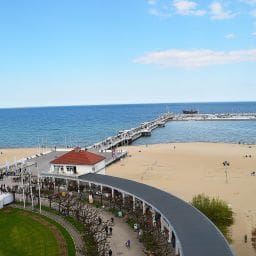Residency vs. Visa: What’s the Difference?
- 🛂 Visa: A visa is a short-term permission that allows entry into Poland, generally for up to 90 days in any 180-day period for tourists or short business stays.
- 🏠 Residency Permit: If you plan to live in Poland longer than 90 days, you will need a temporary or permanent residency permit, which allows you to legally stay and possibly work in Poland.
Type D Visa
Planning to bring your partner to Poland? Whether it’s for work, study, or a new life together, applying for a Type D visa is a crucial step in ensuring a smooth relocation. A Type D visa, also known as a national visa, allows foreigners to stay in Poland for over 90 days within a 180-day period. This visa is available for a variety of reasons, including work, studies, and family reunification – Check out the application process
…Navigating the rules for residency, visas, and work permits in Poland might seem overwhelming at first, but with the right guidance and up-to-date information, you’ll find the path to legal stay and employment much smoother!
Types of Residency Permits in Poland
1. Temporary Residence Permit (Karta Pobytu Czasowego)
- 📅 Valid for up to 3 years.
- 🎯 Granted for specific purposes: work, study, family reunification, etc.
- 📍 Must be applied for in Poland at your local Voivodeship Office (Urząd Wojewódzki).
2. Permanent Residence Permit (Karta Stałego Pobytu)
- 🧬 Granted to foreigners with Polish heritage, long-term residents, or spouses of Polish citizens after a certain period.
- 📜 Valid indefinitely and allows for nearly all rights that Polish citizens enjoy (except voting).
3. Long-Term EU Residence Permit
- 🕔 Requires 5 years of continuous legal stay in Poland.
- 🌍 Allows easier movement and work within other EU countries.
Residency Through Marriage
If you’re married to a Polish citizen, you can apply for a temporary residence card based on family reunification. After a few years (usually 2-3 years of continuous residence), you may qualify for permanent residency.
Example: A British citizen married to a Polish spouse living in Kraków can obtain a temporary residence permit valid for 3 years.
⚠️ Important: While the official processing time for obtaining Temporary Residency in Poland is 60 days, in reality, it can take several months or even up to 2 years, depending on the region where you apply.
During this waiting period:
-
❌ You are not permitted to work
-
❌ You cannot leave Poland, or your application may be cancelled
Plan accordingly and be prepared for potential delays.
Potential workaround: You might want to consider applying at a regional office with shorter processing times. However, keep in mind that you’d need to reside in the region served by that office.
Do I Need a Work Permit if I Have a Residency Card?
This depends on:
- 📄 The type of residency permit.
- 💼 Whether your residency includes the right to work.
Some residence cards explicitly allow employment without the need for a separate work permit. Always check the “remarks” section on your card or with your local immigration office.
EU vs. Non-EU Citizens
- 🇪🇺 EU Citizens: Do not require a visa or work permit to live and work in Poland, but must register their stay after 90 days.
- 🌍 Non-EU Citizens (e.g., British citizens post-Brexit): Must apply for a temporary residence permit and may require a work permit unless exempt.
Can You Work for a Foreign Company While Living in Poland?
If you live in Poland more than 183 days in a year, you are generally considered a tax resident in Poland. That means:
- 💰 You need to declare and pay Polish income tax on global income, even if your employer is abroad.
You may need to register as self-employed (działalność gospodarcza) or use an intermediary such as an Employer of Record or local accountant to handle contributions to ZUS (Polish Social Security).
Health Insurance in Poland
- 🏥 If you work in Poland legally, you are typically covered under the NFZ (National Health Fund) via ZUS contributions.
- 💸 If you’re not paying into ZUS, you can pay voluntarily for public healthcare or purchase private insurance.
- 👨👩👧👦 Spouses of Polish citizens employed in Poland may also cover their family members under their NFZ contributions.
Tax Considerations: The UK-Poland Agreement
There is a double tax agreement between the UK and Poland. However, this operates under a tax credit system, meaning:
- 📈 You declare your income in Poland.
- 🇬🇧 If you’ve already paid tax in the UK, that amount is credited against your Polish tax liability.
- ⚖️ You may still owe the difference if Polish tax rates are higher.
Summary: Key Steps for Residency & Work Setup in Poland
- ✔️ Confirm your visa or residency status.
- 🔍 Check if your residence card includes the right to work.
- 💼 Inform your employer if you will live permanently in Poland—they may need to handle tax and ZUS.
- 🤔 Consider alternatives like self-employment or Employer of Record setups.
- 🏢 Register with your local Urząd Wojewódzki.
- 💳 Set up your tax micro account for monthly income tax declarations.
- 📊 Evaluate your pension situation (UK vs PL contributions).
Secure health insurance (ZUS/NFZ or private).
Additional Info
Need to chat with the EU team at the Foreigners’ Office in Warsaw? Give them a ring directly at 22 695 6752 – they’re ready to take your call!
To obtain a work permit in Poland, you must have a job offer from a Polish employer willing to navigate the work permit process for a non-EU citizen. However, securing such an employer can be quite challenging. On the positive side, there are warehouse jobs available where employers are open to sponsoring work permits for their staff. Most of these roles are through agencies, and candidates from countries like India, Nepal, and the Philippines are generally in higher demand than British nationals. Additionally, the pay is often very low, with salaries around £1,000 per month before taxes.
Workaround
Finding a job in Poland without a university degree and requiring a work permit can be challenging, as many employers are hesitant to navigate the additional paperwork. However, one potential route is enrolling as a student. While many private universities offer flexible or weekend-only classes, this status allows you to work legally in Poland without a separate work permit.
As a student, you can earn a modest income—many international students find part-time roles with companies like Testronic or Lionbridge, especially in English-language game testing. Though the pay is usually at minimum wage, if you’re under 26 and comfortable with shared accommodation and a modest lifestyle, it’s possible to make ends meet in Warsaw.
Settled Status
Ever heard of ‘Settled Status’? If you’re Polish and you’ve been living in the UK for 5+ years, it gives you the right to come back if things don’t work out after moving back to Poland. Just a bit of extra security, just in case.
Settled status in the UK refers to an immigration status granted to EU, EEA or Swiss citizens (and their family members) under the EU Settlement Scheme. It was introduced in response to the UK leaving the European Union (Brexit), to allow those who had been living in the UK to continue doing so lawfully after free movement ended.
Key points about settled status:
Eligibility: You must have lived in the UK continuously for 5 years (known as ‘continuous residence’) to qualify.
If you haven’t lived in the UK for 5 years, you may be eligible for pre-settled status instead.
Application deadline: The original deadline was 30 June 2021, but late applications are still accepted in certain cases.
Benefits of settled status:
- 🇬🇧 You can stay in the UK indefinitely.
- 💼 You can work and study.
- 🏥 Access to the NHS.
- 💰 Access to public funds and benefits (if eligible).
- ✈️ Travel in and out of the UK.
- 🛂 You can apply for British citizenship (if you meet the other criteria) after holding settled status for 12 months.









